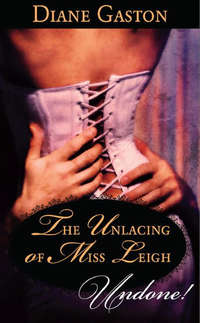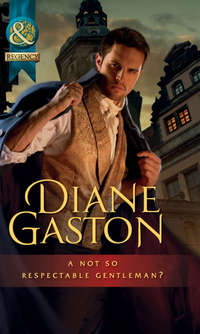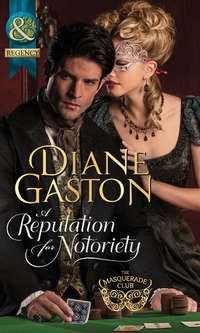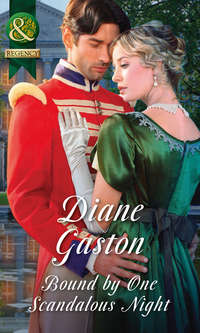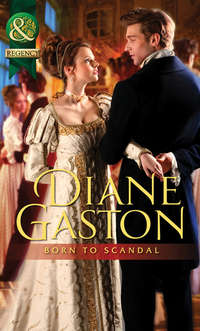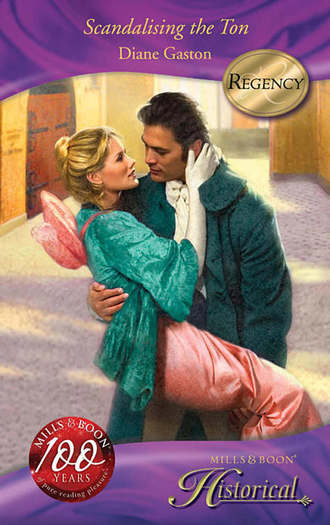
Полная версия
Scandalising the Ton
He stepped back and pulled off his boots and trousers. Lydia removed her remaining shoe and stocking, taking in his naked body through half-closed eyelids.
He was indeed a magnificent man.
And an aroused one. Her eyes widened. Here must be another reason he pleased women so well.
Lydia extended her hand to him and pulled him towards her, making room for him on her bed, pulling the blankets away as she did so. He joined her and covered her with his body, warming her—she had not realised she’d been so very cold. His hands stroked her with exquisite gentleness, relaxing her in places she’d not known she’d been tense. She stretched, arching her back like a cat. He closed his palms over her breasts and need consumed her.
She grasped his neck and pulled him down to her lips again, wanting him to breathe his strength into her. She longed for him to join himself to her. She longed not to feel so alone. So betrayed. So abandoned.
He broke the kiss and, as if reading her mind, took charge, moving his lips down her neck, tasting her nipples. Then he slid his hand to her feminine place and slipped his fingers inside her.
She had never experienced such a thing. Wexin had never done anything like this with his fingers. The intensity of the pleasure stunned her. Adrian seemed to know precisely where to touch, how to touch, until she was writhing beneath him, moaning in a voice that sounded more primal than her own.
Her climax burst forth inside her, so intense she cried out and clung to him as the waves of pleasure washed over her, and washed over her again.
When it ebbed, confusion came in its wake.
“But what of you, Adrian?”
Her husband always saw to his own pleasure first. She did not know her pleasure could come in such a different way.
He held her face in his hands. “We are not finished, Lydia.”
She took in a ragged breath.
He lay beside her, his head resting on one hand, the fingers of the other hand barely touching her skin, but stroking slowly and gently until she forgot her confusion and became boneless and as pliant as putty. To her surprise, her desire grew again, but less urgent than before.
His lips traced where his hands had been, his tongue sending shafts of need wherever he tasted her. He touched her feminine place again, with such gentleness she thought she might weep out of sheer bliss. It still seemed it was her pleasure, not his, that guided his hand. He made her feel cherished, revered.
“Adrian,” she murmured, awash in this new sensation.
Slowly, very slowly, her desire escalated, until again she writhed with need.
“Now, Lydia,” he whispered into her ear.
He climbed atop her again and stared into her eyes as he slowly slipped his entire length into her, each second driving her mad with wanting. Lydia gasped as he began to move, still slow and rhythmic, like the intricate moves of a dance. She moved with him, but the pace he set kept the ultimate pleasure just out of her reach. He moved with such confidence, she gave herself over to him, trusting he would bring her to where she so very much wanted to go.
His pace quickened and her need grew even greater. The sound of their breathing filled the room, melding together like voices singing a duet.
Her release burst forth and she saw stars brighter than at Brighton. She thrilled when his seed spilled into her. They pressed against each other, moaning with a pleasure that burned away her desolation.
Gradually the pleasure waned, but left in its wake a delicious feeling of satiation.
He slid off of her and lay next to her, breathing hard. “Lydia,” he whispered.
“Mmm,” she murmured, snuggling against him.
She must have fallen asleep, but the knocker sounding on the townhouse door woke her with a start. She heard voices outside.
The newspaper people. Would they never stop hounding her? She sat up, covering herself with the bed linens and realising what she had just done.
She’d begged the dashing Adrian Pomroy, who conquered women more easily than Napoleon had conquered countries, to make love to her. And he had obliged.
“There is no one here to answer your door,” he said.
She groped around for her shift. “I do not want my door answered.” Covering her mouth with her hand, she squeezed her eyes shut. “They must not see you here.” Finally her fingers flexed around the muslin of her shift. She pulled it on over her head and climbed off the bed. “You must get dressed.” Hopping on one foot, she tried to gather his clothes. “Leave here by the rear door.” She twisted his shirt in her hands. “The gate. You cannot lock the gate.” She shook her head and reached for his waistcoat. “Never mind the gate. The servants will be here soon and they will lock it behind them.”
He seized her arm. “Lydia, calm yourself. They will not see me.”
It was not only the reporters or creditors fuelling her alarm. Her own wanton behaviour had shocked her much, much more.
She shoved the shirt and waistcoat into his hands.
He dressed as quickly and efficiently as he had undressed. Buttoning his waistcoat, he said, “I will call upon you tomorrow.”
“No!” she cried. She forced herself to sound rational. “You cannot come here again, Adrian. If you are seen here, there will be more scandal.” She hopped over to the chest of drawers and pulled out a robe of Chinese silk. She wrapped the robe around her. “Please, just go.”
He strode over and enfolded her in his arms, pressing her ear against his beating heart. “Be calm,” he murmured. “Your troubles will vanish soon.”
She wanted to laugh hysterically. Once she had believed that troubles were what other people experienced, but she knew differently now. Now it seemed trouble would follow her to the end of her days.
“I’ll lock your gate and throw the key back into the garden.” He released her, but placed one light kiss on her forehead. “And I will return.”
“You must not return,” she pleaded.
He flashed a smile before walking out of the bedchamber.
She hobbled to a room at the back and peered into the garden, telling herself she just wanted to be certain he left by the rear of the house. She could never allow him to call upon her, but she could gain one last glimpse.
He, no more than a shadow now, appeared in the garden and crossed to the back gate with a long-legged stride. When he reached it he turned back towards the house and lifted his face to the upper windows. With a gasp, Lydia jumped back, although she doubted he could have seen her. Slowly he turned back to the gate, opened it a crack, and peeked out before walking through, out of her sight.
Out of her life.
Chapter Two
What magic allure does the Lady possess, to turn a man to such desperate acts? Who will her next victim be, this Siren, this daughter of Achelous, who sings men to their deaths?—The New Observer, November 12, 1818
Adrian entered White’s gentlemen’s club, his senses still humming, the lovemaking with Lydia still vibrating through him so powerfully he wondered if others could sense it.
He felt strong and masculine and completely devoid of the amorphous discontent with which he’d been lately plagued. It had vanished when he had walked into Lady Wexin’s life. Adrian fought the impulse to turn around and retrace his steps to John Street, to scale the walls of her garden if necessary, to enter her house, and repeat the lovemaking that had stirred his senses to such heights.
The footman stationed at the door of White’s greeted Adrian with undisputed normality, chatting about the weather while assisting Adrian out of his coat. Adrian glanced over to the bow window, but no one sat there. He made his way through the club to the coffee room.
Several men nodded a greeting, and Adrian had to suppress a smile. They had no idea that he’d just left the bed of one of London’s most beautiful, and now most notorious, women. And they would never know of it.
A voice called from across the room, “Cavanley! Over here. Join us.”
Adrian glanced around, expecting to see someone summoning his father, but it was his father who was waving to him from a table in the corner of the room. Adrian rubbed his face in dismay. He, not his father, was Cavanley now.
Since Adrian’s father had inherited the title Earl of Varcourt from a distant and elderly cousin who had very recently passed away, Adrian now had the use, by courtesy, of his father’s lesser title of Viscount Cavanley. Inheriting his father’s titles with all their rights, responsibility, and property would only occur upon his father’s death. At present, he merely gained the privilege of being called Viscount Cavanley. Adjusting to the new appellation was more difficult than he’d anticipated.
The new Earl of Varcourt waved with more vigour, signalling Adrian to join him. His father sat with the Marquess of Heronvale and Heronvale’s brother-in-law, Lord Levenhorne.
Adrian crossed the room and greeted them. “Good evening to you.” He bowed to each in turn. “Lord Heronvale. Lord Levenhorne. Father.”
His father gestured for him to sit. “What are you drinking, son?”
“Port will do,” Adrian responded.
His father clicked his fingers to a nearby footman. “Port for Lord Cavanley,” he cried in a loud voice.
At least his father had no difficulty using his son’s new title.
The new Lord Varcourt turned back to Adrian. “Are you bound for the card room?”
Adrian’s father relished his son’s success at cards, boasting that Adrian’s winnings would eclipse the family fortune one of these days. An exaggeration, of course, although Adrian did often win.
“Not today,” he replied.
His father beamed and turned to Heronvale and Levenhorne. “It is said my son won a bundle off Sedford the other night.”
Adrian drummed his fingers against the white linen tablecloth. “The cards were good to me.”
The loss must have hurt Sedford, Adrian thought with some guilt, but he guessed Sedford would be in the card room again tonight, drinking just as heavily, losing just as swiftly. Sedford would be better off if he spent more time at his wife’s musicales, even if they were deadly affairs.
“They say Sedford played foolishly.” Levenhorne drained his glass and signalled the footman for another drink. “I’m sick to death of reckless card players and the problems they cause others.”
“I’d heard the man enjoyed cards a great deal more than his skill at them ought to have permitted,” Heronvale said.
Adrian glanced from one to the other. “You have lost me. Do you speak of Sedford?”
“Of Wexin,” his father explained. “We were speaking of Wexin before you arrived. Levenhorne stands to inherit his title, you know.”
Levenhorne rolled his eyes. “Of course, I must wait the blasted ten months to see if Wexin’s widow produces an heir. Ten months during which I could be solving problems that are likely to be mine and will only become worse for the wait.”
Adrian straightened in his chair.
The law gave a peer’s widow ten months to give birth to an heir. As next in line to inherit, Levenhorne had no choice but to wait.
Levenhorne gave a dry laugh. “It is fortunate Wexin died, is it not? Things would be in even more of a mess if he’d been hanged for treason.”
Seizure of the title, forfeiture of the property—all would have been possible had Wexin been convicted and hanged. It was complicated, indeed, but Levenhorne could not know how truly complicated. Tanner had confided to Adrian that Wexin shot himself, but Tanner had convinced the Scottish officials to declare Wexin’s death accidental. “To minimise the scandal and ease Lady Wexin’s suffering,” Tanner had explained. It also vastly simplified the settling of Wexin’s estate.
“Ah, the drinks have arrived.” Levenhorne looked towards the footman who approached the table carrying a tray. He grabbed his glass, shaking his head. “Wexin’s debts are staggering. The man owes money all over town.” He took a fortifying drink. “Or I should say, owed money. He was damned reckless in his spending. Or perhaps it was Lady Wexin who spent like an empress. The trustee has clamped down on her, I tell you.”
“Indeed?” Adrian’s interest increased.
Levenhorne shrugged. “Her father will pay her debts, I suspect, although he will be none too pleased when he discovers the townhouse he purchased as a wedding gift is now mortgaged to the hilt.”
Adrian’s father spoke up. “I heard Strathfield was on a tour. His son as well. Headed to Egypt and India.”
Strathfield was Lydia’s father and as wealthy as any man could wish.
“True.” Levenhorne waved a dismissive hand. “Let her depend on her sister, then.” Lydia’s sister had married quite well. “I’ll be damned if I’ll use my own funds.”
Adrian frowned.
Heronvale broke in. “Her sister’s husband has refused any contact, my wife tells me.” He sipped his drink. “In my opinion Lady Wexin deserves our pity, not our castigation. The newspapers are brutal to her.”
Adrian’s father grinned. “Did you see the caricature in the window at Ackermann’s? It shows her and Wexin standing with a clergyman while Wexin hides a long, bloody knife. One had to laugh at it.”
Adrian failed to see the humour. He tapped on his glass. “Tanner told me Lady Wexin knew nothing about Wexin killing Corland. In fact, Tanner told me that Wexin’s motive was to have been kept confidential.”
Tanner had been on the run with the woman fugitive whom Wexin had framed for Viscount Corland’s murder. The newspapers called her the Vanishing Viscountess and, at the time, her name filled the papers like Lydia’s did now. Tanner had married her in Scotland, and she and Tanner were the ones who had exposed Wexin.
“Who divulged that he’d killed Corland before the man could ruin his chance to marry her, I wonder?” Heronvale frowned. “Someone present at the inquest, I suppose.”
Adrian’s father laughed. “Come now. Who could resist? Tanner is a fool to think such delicious gossip can be silenced.”
Heronvale looked at Adrian. “Tanner is certain of her innocence?”
Adrian bristled at the question. “He assures me she had nothing to do with her husband’s crimes.”
Levenhorne lifted his glass to his lips. “I am not so certain. The papers speculate she knew what Wexin was about.”
Adrian gripped the edge of the table, angry at this man’s insistence on believing the worst of Lydia. Had he not heard Adrian say that Tanner had proclaimed her innocence? Did they believe a newspaper over a marquess?
Another worry nagged at him, one that explained the unlit fire and the absence of servants, if not the purse full of coin.
“How severe was Wexin’s debt?” Adrian asked Levenhorne.
Levenhorne leaned back in his chair. “He was in dun territory, both feet in the River Tick. The whole matter of his estate is a shambles. The executor is Lady Wexin’s brother, who is on that bloody tour of Egypt or wherever.” He shook his head in disgust. “Mr Coutts, the banker, you know, is the trustee. He had the audacity to ask me for funds, which I refused, I tell you.”
Adrian glanced away. Poor Lydia! Adrian could not simply walk away from her difficulties without assisting her, could he?
Lydia sat up in the bed where only two hours before she’d made love with a man she barely knew, one of London’s most profligate rakes. She wrapped her arms around herself, remembering the passion of his lovemaking, the delightful pleasures he had given her. His reputation as a lover was deserved, well deserved.
She blushed. Her life was a shambles, a mockery, a laughing stock. She was a widow who could not grieve, a lady who could not pay her debts, a daughter who could not run to her parents. Only God knew where her parents or brother might be. Greece. Egypt. India. She’d written to all the places on their itinerary. Her sister, merely a few streets away, had been forbidden to help her. Forbidden to see her. And what was Lydia doing? Tumbling into bed with the handsome Adrian Pomroy.
Her maid knocked and entered the room, carrying a tray. “Cook said tomorrow we will have soup, but tonight there is but cheese and bread. I’ve brought you wine. We seem to have a lot of wine.”
Her husband had a great fondness for purchasing the very best wine. Perhaps she could sell it. How would one go about selling one’s wine? She must discuss the idea with her butler.
She smiled at her maid. “It is good of you to bring my meal above stairs, Mary.”
When the other servants had left, Mary, one of the housemaids, had begged to stay and act as Lydia’s lady’s maid. The girl took her new duties very seriously.
Mary set the tray upon its legs so that it formed a bed table across Lydia’s lap. “I ought to have been with you, my lady.” The girl frowned. “I told you not to go to the shops alone.”
But Lydia needed to go to the shops. Had she not, they would have had no money at all. She’d taken several pieces of her jewellery to Mr Gray on Sackville Street and he had given her a fair price.
“Do not fret, Mary,” Lydia responded. “I would have twisted my ankle had you been there or not.” That odious newspaperman would not have allowed a mere maid to deter his pursuit, but events would have transpired very differently if Mary had been there when Adrian had come to the rescue.
She must not think of him.
“You deserved a visit to your mother.” Lydia’s voice came out louder than she intended. “Is she well?”
“Indeed, very well, my lady, thank you for asking.” The girl curtsied. “My brothers and sisters are growing so big. Mum expects them to go into service soon. She is making inquiries.”
“I wish I could help them.” Once Lydia might have given Mary’s siblings a recommendation, but now a connection to the scandalous Lady Wexin was best hidden.
“They’ll find work, never you fear,” said Mary, plumping the pillows.
Would Mary be able to smell Adrian upon the linens? Lydia could. She felt her cheeks burn again and turned her face away, pretending to adjust the coverlet.
“Lord knows how you got yourself home and up the stairs,” Mary went on. She peered in the direction of Lydia’s foot, even though it was under the covers. “You even wrapped your ankle.” She looked pensive. “And managed to undress yourself.”
“I wanted to get in bed.” Lydia’s cheeks flamed. How true those words were!
She glanced quickly at Mary, but the girl did not seem to notice any change in her complexion. Lydia would be mortified if even her loyal Mary discovered her great moral lapse.
Mary straightened the bedcovers again and stepped back. “Is there anything else I can do for you, my lady?”
Dixon, her butler, and Cook would be waiting for Mary below stairs where they would share their meal in the kitchen, the other warm room in the house. “You took the purse to Dixon, did you not? Was there enough to pay the household accounts?”
“I gave him the purse, my lady, but I do not know about the household accounts. Shall I ask Mr Dixon to come up to speak to you?”
Lydia shook her head. “I would not trouble him now. Tomorrow will do.” Let her servants enjoy an evening of idleness. Goodness knows the three of them had toiled hard to keep the house in order and to take care of her, doing the work of eight. Lydia missed the footmen, housemaids and kitchen maid she’d had to dismiss. The house was so quiet without them.
Mary curtsied again. “I’ll come back for the tray and to ready you for bed.”
Lydia gazed at the girl, so young and pretty and eager to please. Mary would be valued in any household, yet she’d chosen to remain with Lydia. Tears filled her eyes. She did not know if she could ever pay her, let alone repay her. “Thank you, Mary.”
Mary curtsied again and left the room.
Adrian’s father lingered after Heronvale and Levenhorne took their leave, both hurrying home to dinner with their wives. “What diversion awaits you this evening, son?”
Adrian tilted his chin. “None, unless I accepted an invitation I no longer recall.”
His father looked at him queryingly. “No visits to a gaming hell? Or, better yet, no lusty opera dancer awaiting you after her performance? A young buck like you must have something exciting planned.”
Adrian finished his second glass of port. “Not a thing.”
“You are welcome to dinner, then. Your mother and I dine alone this evening. I am certain she would be pleased to see you.” His father stood. “Come.”
Why not? thought Adrian. A glance around the room revealed no better company with whom to pass the time, and he had a particular dislike of being alone this night.
As they strolled through the streets of Mayfair where all the fashionable people lived, Adrian was mindful that he’d walked nearly this same route before. The Varcourt house, part of his father’s new inheritance, was on Berkeley Square, only a few roads away from Lydia’s townhouse on Hill Street.
And the garden gate he’d carried her through on John Street.
“You are quiet today,” his father remarked.
Adrian glanced over at him, realising he had not uttered a word since they’d left White’s. “Forgive me, Father. I suppose I was woolgathering.”
His father’s brow wrinkled. “It is not like you at all. Are you ill? Or have you got yourself in some scrape or another?”
“Neither.” Adrian smiled. “Not likely I’d tell you if I were in a scrape, though.”
His father laughed. “You have the right of it. Never knew you not to get yourself out of whatever bumble-broth you’d landed in.”
It was perhaps more accurate to say Tanner always managed the disentanglement, but Adrian’s father probably knew that very well.
“What is it, then, my son?” his father persisted.
Adrian certainly did not intend to tell his father about his encounter with Lady Wexin. Likely his father would see it as a conquest about which he could brag to his friends. Adrian was not in the habit of worrying over the secrecy of his affairs, but Lady Wexin’s name had been bandied about so unfairly, he had no wish to add to the gossip about her.
Adrian did wish he could explain to his father the discontent he’d been feeling lately. His father would in all likelihood pooh-pooh it as nonsense, however.
His father seemed to believe there could be no better life than the one Adrian led, spending his days and nights gambling, womanising and sporting. Adrian had lately wished for more than horse races or card games or opera dancers, however. He was tired of having no occupation, no purpose, of feeling it would take his father’s death to bring some utility to his existence.
Adrian’s discontent had begun about a year ago when he’d accompanied Tanner on a tour of his friend’s estates. He’d marvelled at Tanner’s knowledge of his properties and the people who saw to the running of them. Adrian had learned a great deal about farming, raising livestock, and managing a country estate during that trip, more than his father had ever taught him. Adrian’s restlessness had increased recently after learning of Tanner’s sudden marriage. He did not begrudge his friend’s newfound domestic happiness; surprisingly enough, he envied it.
His father came to an abrupt halt. “Good God, this is not about some woman, is it? Do not tell me. I’ll wager it is Lady Denson. The word is she is quite enamoured of you, as well any woman would be.”
An image of Lydia flew into Adrian’s mind, not Viola Denson, who had indeed engaged in a flirtation with Adrian, but one in which he could not sustain an interest.
“Not Lady Denson,” he replied. “Nor any woman, if you must know.”
And it seemed his father always wanted to know about Adrian’s romantic conquests. He told his father as little as possible about them.
If his father were paying attention to more than Adrian’s love life and gambling wins, he’d recall that his son had asked to take over some of the family’s lesser holdings. He’d thought it proper to ease his father’s new burdens of all the Varcourt properties, but the new Earl of Varcourt would have none of it. “Plenty of time for all that,” his father had said. “Enjoy yourself while you can.”


